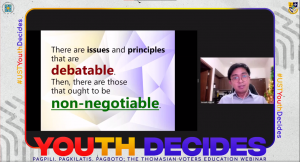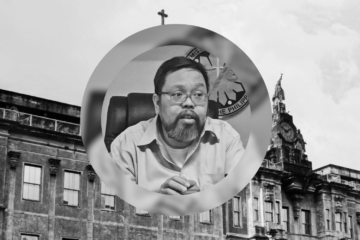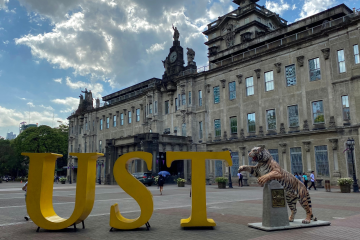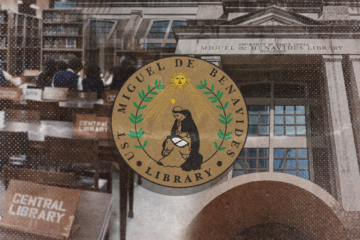
ISSUES INVOLVING human rights and due process should be “non-negotiable” and wrong presumptions about them should be corrected as the country prepares for next year’s elections, a law professor said.
UST civil law professor Kenneth Manuel said Filipinos should make a firm stand on human rights, due process of law, and education as a right as well as on equality, history, and the principles of democracy.
“We can agree to meet halfway with respect to certain issues but with respect to, for instance, historical revisionism, no, we won’t budge. With respect to lack of due process, no, we won’t concede. These are some things that are supposed to be non-negotiable, these are supposed to be firm,” Manuel said during the ‘YOUth Decides: Pagpili. Pagkilatis. Pagboto’ webinar last Oct. 26.
He clarified that the “non-negotiables” should be adhered to consistently, but not rigidly, by welcoming others’ opinions and discussing why their views may not necessarily be correct.
“Not just because we hear a contrary opinion, we will already dismiss it as something stupid, as something that does not deserve any discussion,” Manuel said.
“We will be consistent with what has been settled as facts, but of course, we will not be rigid. We will still entertain discussions to the contrary but we will drive home to the point that ‘here are the facts, here is the correct stand,’” he added.
Manuel said the youth also has to scrutinize opinions and call out falsehoods in the upcoming elections.
“Opinions are not respected. Tao ang nirerespeto (It is the person we respect), but not that opinion. If that opinion is wrong, then it deserves to be called out as wrong,” he added.
Faculty of Arts and Letters Student and Welfare Development coordinator Asst. Prof. Louie Ignacio said consistency with one’s political stand is necessary for elections to be successful.
“Political maturity means you remain firm with your political stand,” Ignacio said.
“You do not switch stands only because of trends, or only because of convenience, or you do not subscribe to someone just because it’s convenient for you and change sides anytime,” he added.
Power of youth voters
Manuel said the youth can dictate the results of the election since they account for more than half of all registered voters.
“Your opinion is something that translates into your vote, and your vote will translate into a policy in the future, and that policy would […] affect everyone,” the law professor said.
Manuel said young Filipinos should use social media to convince people to vote rationally and to prevent the spread of “fake news.”
“We (youth) are the masters of social media. Gamay na gamay na natin ang (We are already adept to) social media, […] how to engage, how to comment, what to see, what not to see on social media,” he said.
Ignacio and Manuel urged the youth to exercise their right to vote in the 2022 national election.
“Vote for someone with a good track record, vote for someone whose advocacy aligns with your personal advocacy, vote for someone who’s morally upright, and vote for someone who runs and who will work all for the country,” Ignacio said.
The voters education webinar was organized by the UST Student Central Council and various organizations in the university including the Artlets Student Council and The Political Science Forum. F – Karen Renee S. Nogoy



